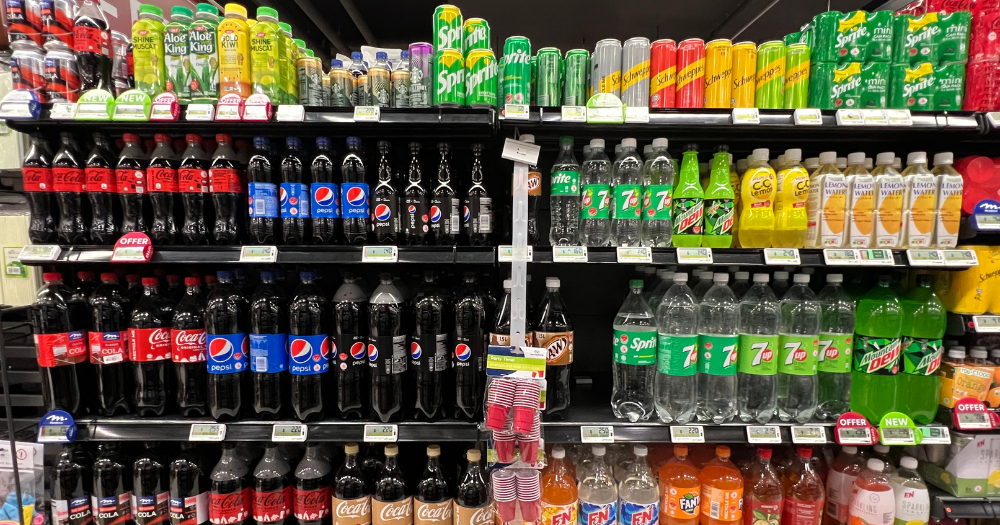Follow us on Telegram for the latest updates: https://t.me/mothershipsg
A refundable deposit of 10¢ will be applied to containers of pre-packaged beverages beginning Apr. 1, 2025.
This will apply to plastic and metal beverage containers ranging from 150ml to 3000ml in volume.
The announcement was made in Senior Minister of State for Sustainability and the Environment Amy Khor’s opening speech during the second reading of the Resource Sustainability (Amendment) Bill on Mar. 21, 2023.
The Bill, which passed in Parliament on Mar. 22, contains amendments to the Resource Sustainability Act that will provide legislative frameworks for measures such as the beverage container return scheme as well as the upcoming plastic bag charge.
These measures aim to reduce waste and increase recycling by driving behavioural changes.
Get 10¢ refund at return points
The beverage container return scheme was first mooted by the National Environment Agency (NEA) back in September 2022.
Previously, it planned to implement the scheme from mid-2024.
The new commencement date in 2025 was requested for and proposed by industry players, according to Khor.
Following the scheme's implementation starting Apr. 1, 2025, pre-packaged beverages contained in plastic or metal containers that are 150ml to 3000ml in volume will be priced 10¢ more.
However, the 10¢ deposit can be refunded with the return of the empty beverage container at designated return points.
Under the scheme, SFA-licensed supermarkets with floor areas of more than 200m2 will be required to set up such return points.
This translates to about 400 supermarkets.
Additional return points will be set up in other accessible locations in the community.
The 10¢ will not be subjected to GST.
Transition period between Apr. 1 and Jun. 30, 2025
Beverage containers under the scheme and eligible for refunds will carry a deposit label made up of a unique deposit mark and barcode.
The beverage and retail industry will have a three-month grace period between Apr. 1 to Jun. 30, 2025 to clear unlabelled stock that do not carry the deposit, Khor said.
From Jul. 1, 2025, all beverage products in applicable pre-packaged containers must carry the deposit label.
All suppliers must also collect a deposit for each of these products when they are sold.
Under the amendments to the Resource Sustainability Act, penalties will apply to anyone who supply or offer to supply in Singapore beverage products that do not carry the deposit label after Jul. 1, 2025.
To run the scheme, an industry-led, not-for-profit scheme operator will be set up, NEA said in a media release.
A return rate target will be imposed on the operator, starting with 60 per cent in the first year, followed by 70 per cent in the second and 80 per cent by the third year.
"At the steady state of 80 per cent, this is estimated to amount to around 800 million beverage containers collected for recycling annually," Khor pointed out.
A financial penalty of up to S$500,000 will be imposed on the scheme operator if it does not meet the return rate target, Khor pointed out.
10¢ strikes balance between incentive and cost
Khor shared during her speech that the majority of respondents (about 84 per cent) in a recent REACH survey indicated that "a deposit amount of 10¢ or higher would be suitable".
The minister acknowledged that higher deposit would encourage participation and a higher return rate, but "we do not want the deposit to be too high such that it deters purchases".
"Hence, on balance, we determined that a 10 cents deposit per container would suffice to help achieve an 80 per cent return rate target," Khor explained.
According to NEA, plastic bottles and metal cans are included as they comprise about "70 per cent of beverage containers put to market, have high material values, and are easy to collect, compact and recycle".
Packaging waste currently makes up a third of the domestic waste disposed of in Singapore, of which 60 per cent is plastic waste, NEA wrote.
In 2021, only six per cent of plastic waste generated was recycled.
Food waste reports required of building managers from Jan. 1, 2024
Apart from the beverage container deposit, the amendment Bill to the Resource Sustainability Act also included new regulations with regards to food waste, NEA and MSE said in a jointly-issued media factsheet.
Food waste reporting will be required for new buildings from Jan. 1, 2024.
Food waste reporting requirements for existing buildings will commence progressively from the second half of 2025.
Under the original requirements of the RSA, building managers of new buildings were required to treat their segregated food waste on-site.
The amendment Bill will now allow managers of new buildings to treat food waste off-site.
"With NEA’s approval, occupiers of both new and existing buildings will also be able to pursue food waste segregation and treatment arrangements separate from those provided by the building managers," NEA and MSE said.
Top image via Mothership
If you like what you read, follow us on Facebook, Instagram, Twitter and Telegram to get the latest updates.
